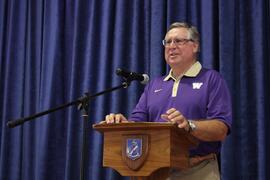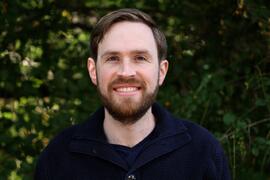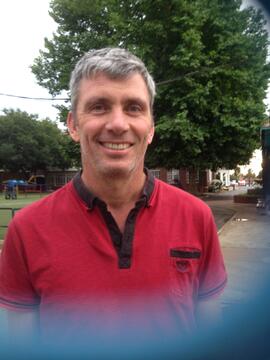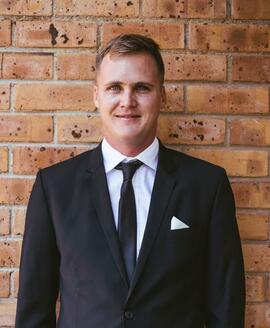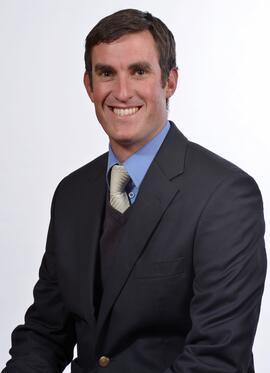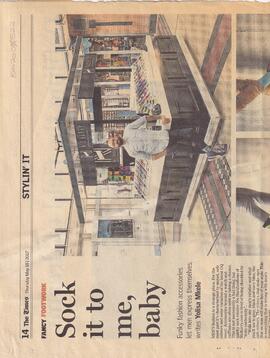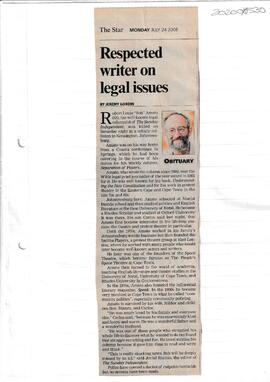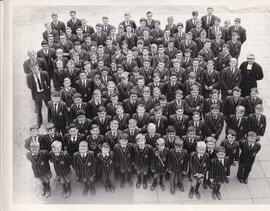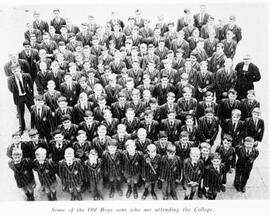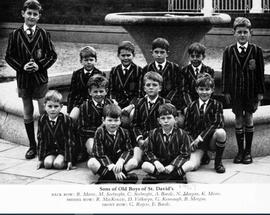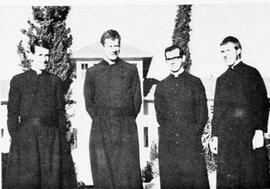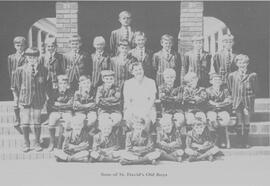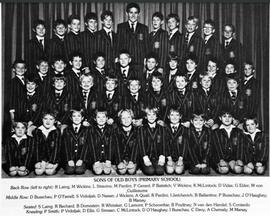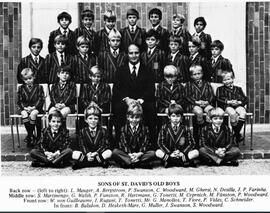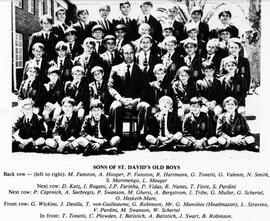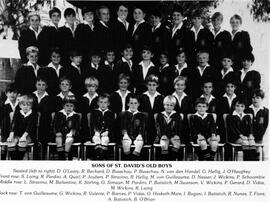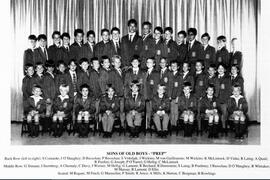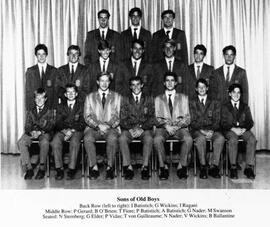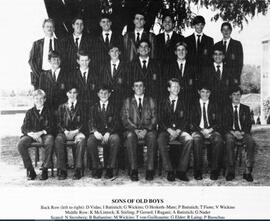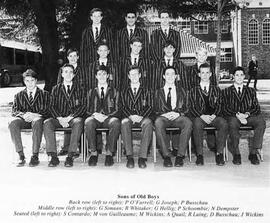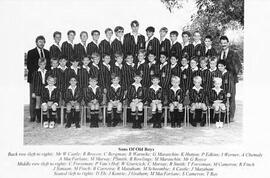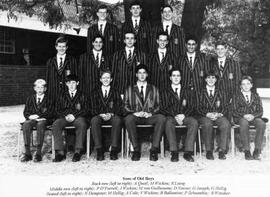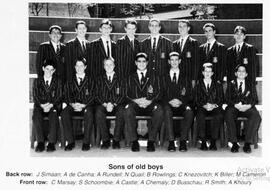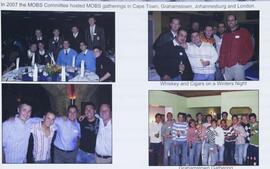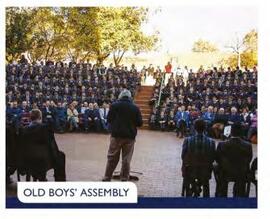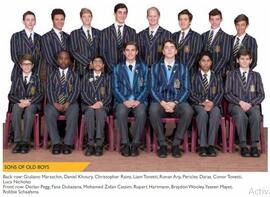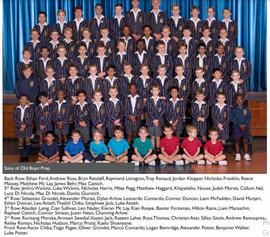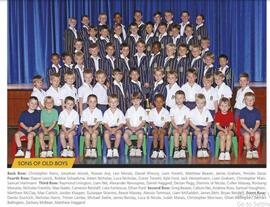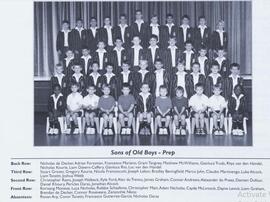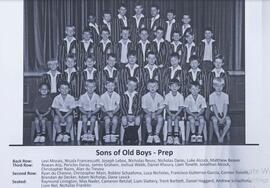Interview with Terence K. Lavery -1967 aka – T
Years attended Marist Inanda – 1956 -1967 – Matriculated 1967
My oldest brother Rory (1965) and I carpooled from Emerentia Ext. with Kevin & Johnny Peel
from 1956 – 1965. In 1966 & 1967 I boarded at Marist InandaThere really were not any pros to
being a day boy, it was what it was and we didn’t know anything else and I did feel sorry for the
boarders that had to remain at school over the week-ends but sports and activities made the
week-end go by quickly.The cons to being a day boy for the Lavery’s & Peel’s were that we had
to get up rather early to execute the carpool and that we were dropped off early, usually 1 to 1-
1/2 hours before school started (until standard 7, when they implemented a new period that
started @ 7:45am) and we were picked up 5:00pm to go home. This made an extremely long
day, especially in the early years. Special arrangements had to be made when we were let out
of class early and many times we had to wait until 5:00pm to be picked up. The other con was
that we did not get to play or know the children in our neighborhood, since we arrived home so
late.
The pros to being a boarder, especially in standard 9 & matric was the structured day, study
hall, rosary, chapel, meals and bedtime. Boarding (and the military service) taught you to eat
anything and everything otherwise you went hungry. You became better friends to your
boarding classmates.
The cons were the limited access to radio music (a form of broad punishment) and news
papers. In hind sight I missed a lot of music influences in 1966 & 1967 and world and local news
events (Sharpsville riots) that influence and mold teenagers in that age bracket. This really
showed up when I was attending the University of Washington in Seattle, WA 1970-1974.
My 1st day is still a vivid memory, very apprehensive but not like some others that day as I was a
3rd sibling and my oldest brother Rory already attended Marist Inanda. My mother walking me
into the courtyard of the grade school, on the way to Mrs. Bricks classroom when she spotted
another mom and son next to us walking in the same direction, she grabs his arm and asks
“what your name? – Robert Ashby he replies – good, this is Terence Lavery, you are now
friends.” Robert and 11 other boys walking to Mrs. Brick’s classroom that day matriculated
together in 1967.
My last formal day before matric exams began consisted of short time in the classroom followed
by Joe Stravino, Johnny Astrup and I (only 3 matric boys with cars) deciding to race our cars
around the cinder athletic track, NASCAR style early years, sliding around 3 corners (track had
3 legs of cinder and 1 of glass) completing 1 lap and after 2 additional corners finding Br.
Anthony standing squarely in the middle of the track, hands on his hips causing us to come to a
screeching stop. When each of us exited the track onto the road he asked us “What are you
doing? I’m not going to let you take the final exams.” We went to his office to beg for
forgiveness, and permission to be allowed to take the exams.
I cannot remember the theme of the matric dance but I do remember that the standard 9’s had
done an excellent job of decorating the dining hall and that Susan Davey and I had a wonderful
time. I also remember that my sister Trisha, who attended Holy Cross Convent, helped set up
Joe Stravino with Zenda Lutz and Derrick Schoombie with his date for that night and that they
both of them married their dates that night later in life.
I enjoyed the all boys’ school, the uniforms, the small class room sizes, the brothers, the lay
teachers, the discipline, the friendships, ethnic diversity and the athletic fields, the requirement
to participate in a sport every season.
The aspects I least enjoyed were wearing ties on a hot summer day, caning the entire class for
an infraction by one student, competing against larger schools in sports – KES, Parktown Boys
and Marist Obs and getting crushed. But the passage of time, the 46 years, has diminished the
majority of dislikes.
The Marist Centennial celebration in 1966 with 3 bus loads of students travelling down to St
Joseph in Rondebosch, Cape Town was memorable in more ways than one. Best left
unspoken.
The worst moments at school, in my experience, comprised of the strict and severe disciplinary
measures metered out by the brothers. I recall my 1st caning in grade 2 and my last episode 1
week before I matriculated. But the most memorable was a severe dose metered out by Brother
Andrew one morning in 1st period standard 8 because the entire class was were talking and not
studying as instructed. The entire class was marched out single file to an empty class room and
individually brought back for 4 strokes with the cane. When it was my turn Brother Andrew, who
was left handed, seemed to dispense the strokes with extra vigor and on my return to the class
room I felt blood dripping down my buttocks. Being macho and amongst peers you did not show
any sign of pain or crying and were usually laughing out of pain. I let my peers know that I
believe I was bleeding and was called upon to prove it. I dropped my pant to display the
bleeding to all in attendance, only to have Brother Andrew enter the class room to see me with
my pant around my ankles. “Lavery - What are you doing? Do you want 4 more?” When I turned
around to face him he noticed the blood streaming down my leg and his jaw dropped in surprise,
his eyes got bigger and he mumbled “Get dressed!” and left the class room.
As an epilogue to the above story I do not feel that any of the discipline I received was
undeserving or malicious in nature and it never affected me mentally or physically. I never
notified my parents of any incidents because my father was an old Marist Observatory boarder
from grade 1 to matric (1933) and he would have supplemented the punishment. He too was a
strict disciplinarian.Unfortunately time has erased the funny/amusing incidents but I sure if I
were to attend a class reunion my recollections would be rekindled.Once again, unfortunately
time has erased the names and faces of the teachers but the following 3 were clearly influential
in my development. Brother Anthony, Brother Andrew & Brother Timothy come to mind.I was a
prefect but didn’t receive any special awards other than for athletics.
I played all sports at Marist Inanda at that time 1956 1960 swimming, tennis, athletics and
soccer.
1961 1967 – I participated in swimming and water polo team, cricket, tennis, field hockey,
soccer and athletics. We did not attend or have any camps available to us. In all sports I was on
the 1ST Team except cricket which I did not participate in. From 1965 as I was playing baseball
for the Pirates Club and the 1967 1st XV rugby teams as I was training for the Springboks
European tour 1967.I competed for the Southern Transvaal athletics teams from 1964 – 1968 in
all provincial competitions and South African championships and was selected as a Junior
Springbok to compete against Germany 1966 in Bloemfontein, OFS and to tour with the Senior
Springbok team for 4 weeks in Europe July 1967. I still hold 4 South African records in the 100
yards, 220 yards, 220 low hurdles & 440 yards in the U-17 age group.I was selected to attend
the South African Air Force in Valhalla and after my service was completed was given a bursary
to attend Stellenbosch University. I toured with the University of Stellenbosch athletics’ team in
1969 in Rhodesia.
In 1970 at the advice of a mentor, rather than attend the University of Stellenbosch, I applied for
athletics’ scholarships to 14 different USA universities in western or southern states. I accepted
an athletics’ (track) scholarship to the University of Washington in Seattle, Washington State. I
chose to study Business Administration and graduated in December 1974 with a Bachelor of
Science degree in Business Administration with a minor in marketing. In 1975 I attended Wits
University MBA program which I did not complete as I returned to USA in August 1975.
In order to return to the USA on a working permit I was offered a job as an outside Industrial
salesman for a plumbing, commercial and pipe, valves and fittings distribution company in
Seattle, WA. I have been employed there for 38 years and hold the position of national account
manager for The Boeing Company. In this position I administer the support to Boeing for its
ground assembly facilities across the USA, supporting Boeing’s locations in the Puget Sound,
Portland, OR, Southern California, Mesa, AZ, Salt Lake City, UT, St. Louis, MO, El Paso, TX,
San Antonio TX, Philadelphia, PA and Charleston, SC. In 1988 my company Familian
Northwest, Inc was sold to an English company Wolseley, PLC. Which today is the world’s
largest distributor of plumbing, commercial plumbing and pipe, valves and fittings in the world
and USA.
Since I was out of the country I had none of my 3 children attend St. David’s, Marist, Inanda.The
last time I visited St. David’s was in January 2002.
The story I recollect regarding the sports field north (?) of the school is as follows – I believe the
50 acres of property were donated to the school in 1965 +/- and that our students were granted
access to a usually prohibited piece of property for the 1st time. The newly assembled marching
band members use it to practice their bugles and kettle drum music and some members of the
1st VX rugby teams chopped some of the trees down as strength training. Then they started to
bulldoze the lower area for rugby fields and after months of work with large earth moving
equipment the fields had their final shape. I remember that Brother Anthony hire a water
dowsing expert to locate an underground stream or water source and that Brother Andrew, who
maintained the cinder track and cricket pitches, showed us how by using willow branch we
could confirm the location of the water. This is where Mr. Simaan enters the picture, Br. Andrew
was tasked with planting the grass on the newly bull dozed fields, he would allow a selected few
Std 9 & 10 students out during the evening study hall to walk with him as he survey this
monumental task. I’m not sure how this transpired but in short time George Da Matta offered his
father’s flat bed produce truck to Br. Andrew and that a number of us students went over to Mr
Simaans property the following week-end, armed with picks, shovels and pitch forks to harvest
the kikuyu grass that surrounded his property. We returned with a truck load of kikuyu starts that
were subsequently planted in rows starting in the corner closest to the road between the shed
and the property. George Da Matta, Dave Palmer and others that grew up on farms, knew how
to operate the tractor and plow and they hoed perfect rows for us to plant the kikuyu starts. We
did this in the evenings after the african workers had completed their work during the day.
JLE June 2013

